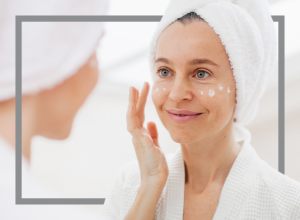Almost everyone has their own skin problem areas, but it is important to treat them correctly. After all, the skin is our largest organ and should therefore be treated with great care and in a healthy way.
Our skin has the important task of shielding our body from the environment and protecting it from drying out. And yet our skin is often exposed to harmful substances and reacts accordingly: rosacea, neurodermatitis or inflamed areas of skin. Here we explain how this manifests itself and how to deal with it correctly.
Our skin shows us what it needs and, above all, how
As an externally visible organ, the skin is also an indicator of a person’s age, health and even mood, among other things. Our skin renews itself approximately every 28-40 days. This ability to function decreases with age and also differs depending on the skin type. If the skin flakes, it lacks moisture in particular. People who tend to have dry skin are often predisposed to it. If the skin shows redness, this may be due to dryness or even intolerance.
Oily areas of skin are usually the result of excessive or unregulated sebum production. “We know from research that genetic predispositions and hormonal fluctuations are also causes of oily skin, as are various medications, stress and heat” (source: LINK).
If we use countless skincare products every day, they often cannot be completely broken down. As a result, they accumulate in the tissue and lead to irritation or loss of natural skin functions. It therefore does no harm to take a critical look at the list of ingredients. Of course, other factors, such as diet or lifestyle, also influence our skin, but much of what we put on our skin contains substances that are harmful to our health, endangers the environment and can have undesirable side effects.
Everyone’s skin is unique, so everyone has a different risk of skin problem areas, with corresponding degrees and shapes. Incorrect skincare routines or ingredients can contribute to this, as well as skin types such as:
Neurodermatitis
Often recognizable by scaly, itchy or sensitive skin. This is due to a defective skin barrier function. These are chronic or recurring skin inflammations. Many sufferers report an impaired quality of life. Other causes include a genetic predisposition, as well as infections, certain foods or stress.
Rosacea
Also known as facial erythema, it is also a chronic disease. Fine veins in the skin are dilated and lead to visible redness. Rosacea is usually attributed to inflammatory reactions. However, the causes are not yet fully understood. A poor diet, such as overly spicy food, sugar, hot drinks or alcohol, but also stress, cosmetics or medication can be possible triggers.
Blemished, oily skin
Excess sebum production makes the skin oily and shiny. A change in hormonal balance, external influences, stress or a poor diet can also be the cause of this. Excess sebum combined with dead small horny particles clog the pores. An ideal breeding ground for bacteria and a starting point for inflammation.
The right way to treat the skin
In all cases, it is crucial to know the causes and protect the skin as best as possible. If the skin tends to be dry, it needs moisture and lipids to compensate for the existing deficits. In the case of oily skin, on the other hand, a product with a much higher moisture content and less oil should be used. If the acid mantle is impaired, the skin’s natural pH value (approx. 5.5) should be restored.
In all cases, this means that the right skin care or cleansing is characterized above all by supporting the skin and ensuring that it remains intact. If necessary, the natural protection against bacteria or germs can be supported with the use of special products, such as skinicer products.
Daily care that avoids harmful ingredients can also help to alleviate skin problems. The rule here is: less is more! We should generally not overdo the number of products and superfluous active ingredients or ingredients only put additional strain on the skin.
Do you have any questions? Feel free to contact our experts by email: info@ocean-pharma.de
Further articles and important tips can also be found in our expert tips, such as the following links with answers on all skin-related topics:
- Impure, oily skin: https://www.ocean-pharma.de/experten-tipps/hautunreinheiten-und-akne-bei-erwachsenen/
- The pH value of the skin: https://www.ocean-pharma.de/experten-tipps/was-der-ph-wert-mit-unserer-hautpflege-zutun-hat/
- The right diet: https://www.ocean-pharma.de/experten-tipps/ihr-hautbild-ist-der-spiegel-ihrer-ernaehrung/
Image source: Irina Bg / shutterstock.com
Experten-Tipp entstand in Zusammenarbeit mit:
Patrick Günther
Patrick Günther completed his pharmacy studies in Hamburg and, after obtaining his licence to practise, worked for several years in marketing and sales in the pharmaceutical industry. In 2003, he took over ocean pharma, the company founded by his father in Reinbek near Hamburg in 1978. Together with his business partner, he patented the important processing and standardisation process for the microalgae active ingredient Spiralin® and developed a wide range of medical cosmetics and foot care products based on Spiralin®.







